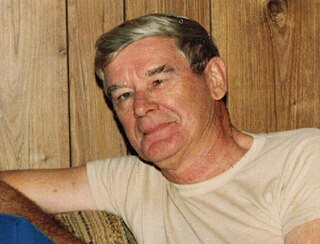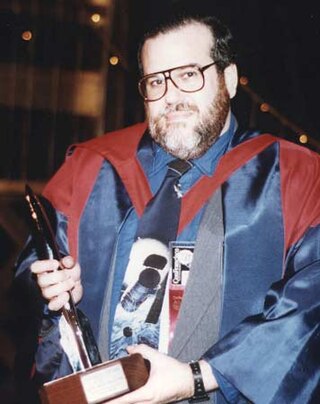
Science fiction fandom or SF fandom is a community or fandom of people interested in science fiction in contact with one another based upon that interest. SF fandom has a life of its own, but not much in the way of formal organization.

A science-fiction fanzine is an amateur or semi-professional magazine published by members of science-fiction fandom, from the 1930s to the present day. They were one of the earliest forms of fanzine, within one of which the term "fanzine" was coined, and at one time constituted the primary type of science-fictional fannish activity ("fanac").

Tom Reamy was an American science fiction and fantasy author and a key figure in 1960s and 1970s science fiction fandom. He died at age 42 prior to the publication of his first novel; his work is primarily dark fantasy.
Mike Glyer is both the editor and publisher of the long-running science fiction fan newszine File 770. He has won the Hugo Award 12 times in two categories: File 770 won the Best Fanzine Hugo in 1984, 1985, 1989, 2000, 2001, 2008, 2016 and 2018. Glyer won the Best Fan Writer Hugo in 1984, 1986, 1988, and 2016. The 1982 World Science Fiction Convention (Worldcon) committee presented Glyer a special award in 1982 for "Keeping the Fan in Fanzine Publishing."
File 770 is a long-running science fiction fanzine, newszine, and blog site published and administered by Mike Glyer. It has been published every year since 1978, and has won a record eight Hugo Awards for Best Fanzine, with the first win in 1984 and the latest in 2018.
Walter Alexander Willis (1919–1999) was a well-known Irish science fiction fan, resident in Belfast.

Arthur Wilson "Bob" Tucker was an American author who became well known as a writer of mystery, action adventure, and science fiction under the name Wilson Tucker.
The 1st World Science Fiction Convention (Worldcon) was held on 2–4 July 1939 in the Caravan Hall in New York City, United States, in conjunction with the New York World's Fair, which was themed as "The World of Tomorrow". It was later retroactively named "NyCon I" by Forrest J Ackerman.
First Fandom Hall of Fame is an annual award for contributions to the field of science fiction dating back more than 30 years. Contributions can be as a fan, writer, editor, artist, agent, or any combination of the five. It is awarded by First Fandom and is usually presented at the beginning of the World Science Fiction Convention's Hugo Award ceremony.
Howard DeVore was an American archivist, science fiction collector, dealer, expert on pulp magazines, APA and fanzine writer, convention organizer, and active volunteer in science fiction fandom.
Philcon, also known as the "Philadelphia Science Fiction Conference", is an annual three-day science fiction convention held at the Doubletree by Hilton Hotel in Cherry Hill, New Jersey. The convention is run by the Philadelphia Science Fiction Society (PSFS). The 1936 Philcon is claimed to be the world's first science fiction convention.

Andrew Ian Porter is an American editor, publisher and active science fiction fan.

The 9th World Science Fiction Convention (Worldcon), also known as Nolacon I, was held 1–3 September 1951 at the St. Charles Hotel in New Orleans, Louisiana, United States.

The 14th World Science Fiction Convention (Worldcon), also known as NyCon II or NEWYORCON, was held on 31 August–3 September 1956 at the Biltmore Hotel in New York City, United States.
The 35th World Science Fiction Convention (Worldcon), also known as SunCon, was held on 2–5 September 1977 at the Fontainebleau Hotel in Miami Beach, Florida, United States.
The 39th World Science Fiction Convention (Worldcon), also known as Denvention II, was held on 3–7 September 1981 at the Sheraton Denver Downtown Hotel in Denver, Colorado, United States.

James LeRoy "Rusty" Hevelin was a science fiction fan, fanzine publisher, collector and huckster.
John V. Baltadonis was elected to First Fandom's Hall of Fame in 1998 for his early contributions to science fiction, including being a founding member of the Philadelphia Science Fiction Society.
The Ditmar Award has been awarded annually since 1969 at the Australian National Science Fiction Convention to recognise achievement in Australian science fiction and science fiction fandom. The award is similar to the Hugo Award but on a national rather than international scale.
Peggy Rae Sapienza, was a science fiction fan, con-runner, and promoter of science fiction fandom. She made memorable contributions to Noreascon III in Boston, the 1989 Worldcon, partnering with Fred Isaacs in conceptualizing the ConCourse, a new feature for Worldcons. A Vice Chair of the 1993 Worldcon, ConFrancisco, she served briefly as Acting Chair after the Chairman died, until a new chairman was appointed. In 1998 she chaired BucConeer, the 56th Worldcon in Baltimore. She served as North American agent for the first Worldcon to be held in Japan, Nippon 2007; in 2010 co-chaired, and 2011 and 2012 chaired the SFWA Nebula Awards Weekends; and was Fan Guest of Honor at Chicon 7, the 70th Worldcon, held in 2012. She co-chaired the 2014 World Fantasy Convention just months before she died due to complications from heart surgery.






